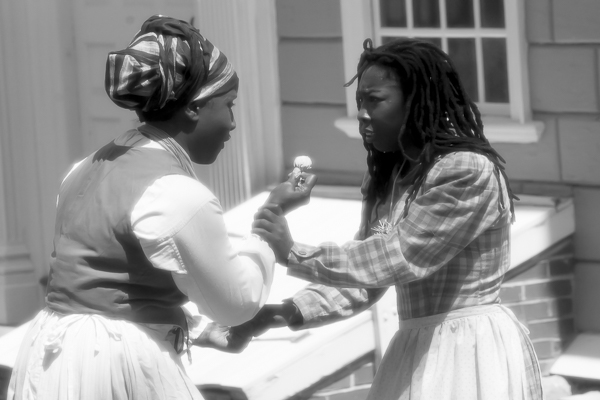Production shot at Royall House and Slave Quarters.
“I’s sick O Massa hans all ova me.”
So begins Ifé Franklin’s 2018 book “The Slave Narrative of Willie Mae” (Wildheart Press).
“This book is historical fiction about a young woman, Willie Mae,” Franklin says. Set in the mid-1800s, Willie Mae is “a 20-year-old African American enslaved woman in Virginia who knows that she’s not a slave. She knows it. She understands it. She’s smart. She’s questioning things.”
The story began as a series of Facebook posts by the Black, queer, interdisciplinary artist over three months about five years ago. “The spirit of my grandmother came to me and said this is how it should be,” Franklin says. “… The book was definitely a gift from the ancestors. They called to me. They said start writing.”
The Boston artist was developing it as an experimental live performance—but for pandemic safety the team reimagined it as a video. The 17-minute short film (three scenes from a planned 17) was directed by Franklin, with support from Emmy-Award winning director Evelyn Moore.
It was filmed by The Loop Lab Production Crew at the Royal House Slave Quarters in Medford, historically “home to the largest slaveholding family in Massachusetts” and believed to be “the only remaining such structure in the northern United States,” according to the museum.
“For this story to be told where enslaved people lived, it is a reckoning. It is an awakening of these souls. It’s a reflection from us to them. It’s actually a call and response. We’re there for them, but they’re already there. I just feel like they’ve been waiting for us to show up,” Franklin says. “They did everything to ensure people like myself would have a life, the life they didn’t have. I know they were proud that we were there. I know the actors feel that way. We could feel them.”
Franklin says, “I’m doing things now to ensure that people who come behind me can live more free.”
Franklin’s film debuts June 19 as part of a day-long Juneteenth Celebration at Black Market in Nubian Square, beginning from noon to 4 p.m. with a land acknowledgement, a calling of the names of ancestors, a brief history of Juneteenth, prayers, music, poetry, live DJ, a mini “Ancestor Slave Cabin” building workshop, an ancestor message board, and a book sale and author signing.
“Hopefully we can do a ring shout,” Franklin says. (Probably around 12:30 or 1 p.m.) “What I want the day to be is a homecoming, a revival, a picnic, like a family reunion.”
After a three-hour break, the film screening and Q&A begin at 7 p.m.—with a limited-attendance indoor screening at Black Market as well as a live stream for online viewing.
“This story,” Franklin says, “it’s about love and healing and family and culture and tradition, the ties of which could never be broken even through the horrors of enslavement.”
As part of her “Indigo Project,” Franklin has led children’s workshops to build miniature slave cabin-like structures as well as constructing a series of large-scale ancestor slave cabin/praise houses that she’s presented accompanied by live performances—including traditional ring shouts, an ecstatic ritual danced in a circle.
“African Americans have PTSD—post traumatic slavery disorder,” Franklin says. “… That’s why we have to heal.”
“The Slave Narrative of Willie Mae” is inspired by and named for Franklin’s actual great-grandmother, Willie Mae McCain, a woman from Virginia, born just after Emancipation, who died when Franklin was 2.
“I’m from a long line of tobacco farmers and sharecroppers,” Franklin says. Franklin’s great-grandfather, she says, died in his 30s from a heart attack, brought on, the family is certain, from the hard labor of sharecropping. When Willie Mae’s husband died, she “was kicked off the land with nine children.”
“In the stories I heard growing up, she was mean,” Franklin says. But more recently her mother clarified: “It wasn’t that she was mean necessarily. It was because she had to be strong.”
Her grandparents left Virginia for Washington, D.C. during the Great Migration, leaving their children with Willie Mae for several years while they found their way.
“They were working all the time,” Franklin says. “My mother told me in the last couple of years that she didn’t meet my grandfather until she was 12 years old.” (Franklin was born and raised in Washington, where her mother still lives.)
In “The Slave Narrative of Willie Mae” book, Willie Mae is taught to read by the planter’s daughter, Miss Ann, a playmate when they were children, now studying in Boston and inspired by the abolition movement here. Miss Ann becomes an ally, offering Willie Mae help in escaping enslavement.
“I wanted to write a narration of enslavement that’s a story of hope,” Franklin says.
Letta Neely authored the script, based on Franklin’s book. “What I love about the film is a lot of my voice is still there. What they did is elaborate it, but it’s still true to the book,” Franklin says.
The cast features Qualina Lewis playing Willie Mae, Tammy Denease as Willie Mae’s mother Virginia, Dayenne Walters as Old Aunt Sara, Michael Gordon Penn as Overseer Jack, and Candis Hilton as Young Miss Ann.
Franklin cast all Black performers. “I wanted all the characters to be Black, even the characters who were written to be white characters.” (Their whiteness is symbolized by wearing white gloves, she says.)
“I thought it would be interesting to have Black people play a role outside of themselves … to feel that power,” Franklin says. “I just wanted this first cast to be Black. This is our story and we need to tell it from our perspective. We need to tell our own stories.”
Ifé Franklin’s film “The Slave Narrative of Willie Mae” debuts on Saturday, June 19, from noon to 9 p.m., (rain date Sunday, June 20), as part of a day-long Juneteenth Celebration at Black Market in Nubian Square, 2136 Washington St., Boston.
Greg Cook runs the Wonderland blog (https://gregcookland.com/wonderland/) and is scheduled to begin painting a mural in Salem's Punto Urban Art Museum in October (http://puntourbanartmuseum.org).


